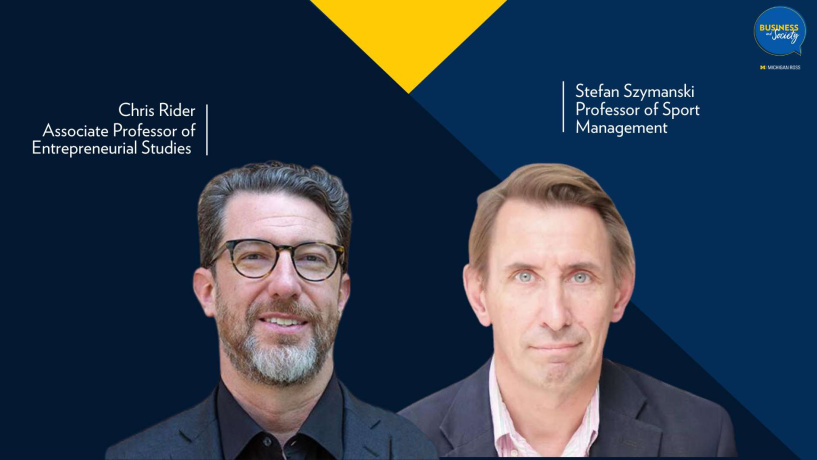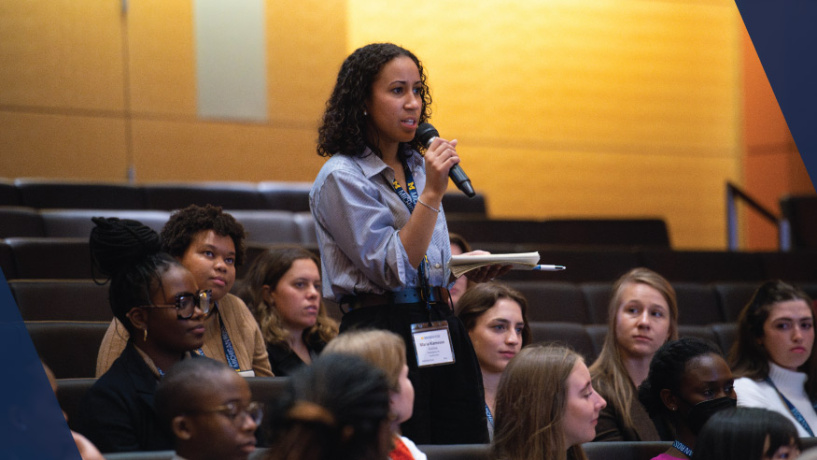One-Year Master’s Students Share What It Means To Be a Woman in STEM

In honor of the International Day of Women and Girls in Science on Feb.11, the Ross School of Business celebrates the innovative and barrier-breaking women of the One-Year Master’s Programs.
STEM, an acronym that stands for the fields of science, technology, engineering, and mathematics, has not always been a welcoming space for women. Even now, the fields remain mostly male-dominated: in 2021, “about two-thirds (65%) of those employed in STEM occupations were men and about one-third (35%) were women,” according to the National Science Foundation.
Despite many barriers to entry in the field, like unwelcoming work cultures and stereotypes, the number of women pursuing STEM careers has increased by 3% between 2011 and 2021, according to NSF.
Many careers under the STEM umbrella are some of the fastest-growing and highest-earning jobs — from analysts to engineers to scientists. Women everywhere are breaking down barriers in order to make STEM more accessible to the promising young leaders of the future.
To delve deeper into what it means to be a woman in STEM, we asked six students in two of the Michigan Ross STEM-designated OYM Programs, the Master of Supply Chain Management and Master of Business Analytics, to share their experiences.
 Austen Hardie, MBAn ’24
Austen Hardie, MBAn ’24
What is your post-graduation career goal?
My post-graduation career goal is to be able to utilize the skills I've learned both in my undergraduate education in math and my graduate education in business analytics and see the impact these skills have on solving real-world problems. While this may not be the most exceptional goal, I want to see the power and influence that my unique skill set holds in the workplace.
At times, we can fall into this trap of feeling like the hard work we do doesn't have a lot of real-world applications; however, I know that the knowledge I've gained over the past five years is invaluable and can make a difference in the business world and beyond. Being able to see this come to fruition and feel as though I'm making a difference in my position within a company is one of the most rewarding goals I can hope to achieve.
How did you become interested in pursuing a career in STEM?
From early in my childhood, I was always drawn to mathematics. I loved the satisfaction of vigorously working through a problem to arrive at the correct solution. Additionally, I was intrigued by the multitude of ways you could approach a problem and still arrive at the correct solution.
This was my first real introduction to the STEM world. Once it became clear the love I had for this discipline, I began applying my problem-solving skills to other STEM fields. I took engineering classes to hone my coding abilities, pursued a graduate degree in data analytics to break into the world of technology, and was even pre-med in undergrad for a bit, gaining my EMT certification. As I explored the world of STEM, my love for the subject matter only increased, and I knew that if I pursued a career in a field I loved, the possibilities would be endless and the feeling of achievement and success would undoubtedly follow.
What does it mean to you to be a woman in STEM?
To me, being a woman in STEM is being a trailblazer. Historically, the field has been male-dominated, making it difficult to break into. However, more recently, there has been an influx of women entering the STEM fields and contributing not only their knowledge and ideas, but their ground-breaking innovations as well. The new perspectives women bring have dramatically altered multiple areas of STEM fields and changed how we think about and approach different problems. Seeing women not only achieve success but excel in the world of STEM has given me the drive to achieve the same goals for myself and the confidence that it is possible.
Who inspires you?
My mom. Since I can remember, my mom has provided both me and my sisters with every opportunity to achieve what we desire. She has shown me how to be compassionate, confident, strong, and respectful. It was her work ethic that sparked a drive in me. I have never seen her leave a task incomplete or inadequate.
She sets a goal for herself, and then she achieves it, all the while looking out for me and my two sisters to ensure we achieve our goals as well. Without her confidence in me and her continuous support, I don't think I would've had the courage to get where I am today. She has been, and always will be, my inspiration.
Do you have any advice for other women looking to pursue careers in STEM?
Do it. The STEM world is filled with endless opportunities. Even if it doesn't end up being your niche, there is so much knowledge to be learned and skills to be developed within these disciplines that apply to many other areas of interest. The STEM fields have now become the foundation of progress and innovation, and it is necessary to understand these different disciplines to keep advancing. I feel that, oftentimes, women are deterred from entering the STEM fields because it appears daunting, and people fear the difficulties that come with the work. While it is true that the STEM world is a lot of hard work, it is also okay to fail. As someone who always wants to do my best, it took me a while to become okay with the failure and look at it as a step toward success rather than a slight against myself.
I figured out how to learn from my failures and adapt to the next situation to avoid my previous mistakes. I think that this is one of the most valuable skills you learn in STEM and also one of the most valuable skills you can learn in life. Failure shouldn't be something that inhibits you from breaking into the world of STEM but rather encourages you. You will always be faced with challenges, and learning how to overcome those challenges is one of the greatest skills you can possess.
 Estefanía Tecuanhuey López, MSCM ’24
Estefanía Tecuanhuey López, MSCM ’24
What is your post-graduation career goal?
My post-graduation career goal is to land a position in sourcing or demand planning in the food/snack industry. I am also considering starting my first entrepreneurial project, which is very exciting.
How did you become interested in pursuing a career in STEM?
When I was in school, I always enjoyed STEM-related courses, particularly math and chemistry. When choosing a major for undergrad, I knew I had to go for engineering, and I am glad I did because it led me to discover supply chain management!
What does it mean to you to be a woman in STEM?
I feel very lucky and grateful to live in a time and place where I am able to pursue my dream career. To me, being a woman in STEM means honoring the work many women did in the past to ensure that women like me have the chance to partake in these fields. It also means being responsible for maintaining a strong work ethic and inspiring other women to join this field, filled with challenges, gratification, and a lot of fun.
Who inspires you?
There are three women who inspire me: my mom and my two sisters. They have all taught me invaluable lessons about love, discipline, and compassion. I look up to them for their courage, strength, and their ability to care for people. They have all achieved great things, and I am immensely proud and inspired to follow in their footsteps.
Do you have any advice for other women looking to pursue careers in STEM?
My advice would be to believe in yourself, in your abilities, and in your potential. Be brave and determined. Work hard and celebrate your wins. And always remember to support the women around you. We all share similar struggles, and it is great to know that we have each other's backs.
 Katelyn Payne, MSCM ’24
Katelyn Payne, MSCM ’24
What is your post-graduation career goal?
My dream job is to be a supply chain management professor. In the meantime, I hope to obtain a role that combines my love for supply chain research, integrity, and sustainability. Across my undergraduate and graduate experience, I had very few female supply chain professors, which is something I hope to change for the next generation of women studying supply chain. After a few years of working in the industry, I plan to pursue a doctorate degree to further my career in academia through research and instruction.
How did you become interested in pursuing a career in STEM?
My parents are civil engineers by trade and run their own land surveying business. Seeing them work through business decisions together inspired me to learn more about the intersection of business and engineering, which is why pursuing a career in supply chain management made perfect sense. I grew up watching shows like Shark Tank, How It’s Made, and The Profit. It made me question how the world operated and always ask why things work the way they do. This curiosity led me to an interest in process improvement, optimization, and sustainability.
What does it mean to you to be a woman in STEM?
Being a woman in supply chain management is not just about pursuing a career for me; it's about making a difference. It means being resilient, inclusive, and contributing to the broader goal of creating a more equitable and diverse STEM community. I feel that, ultimately, being a woman in STEM is about encouraging future generations of women to pursue their passions in these fields.
Who inspires you?
A woman who inspired me as I was starting my supply chain journey and continues to inspire me is Liz Shree. Liz is the founder and creator behind Launched By Liz and Supply Chain Gals, platforms that offer career advice, resources, and community for female leaders. Being featured on Supply Chain Gals last year connected me to so many other women in supply chain. Female leaders in supply chain management like Liz recognize the importance of creating a community that uplifts others while promoting growth and development.
Do you have any advice for other women looking to pursue careers in STEM?
Stay resilient, forge your own path, and, most importantly, don't give up!
 Panathip Chimrak, MSCM ’24
Panathip Chimrak, MSCM ’24
What is your post-graduation career goal?
My short-term goal is to remain in academia and pursue a doctoral journey focused on supply chain management with a dedicated emphasis on sustainability. Looking ahead, my long-term aspiration is to become a professor in Thailand.
How did you become interested in pursuing a career in STEM?
It began with my strong interest in the process of conducting research, which not only provided me with the opportunity to make a meaningful impact on the community through my curiosity but also guided me toward a career shift into the STEM field.
What does it mean to you to be a woman in STEM?
I am proud to be a woman in STEM, with the privilege of studying and conducting research in the field I am passionate about. Hopefully, I can inspire my future students to break gender barriers and follow their passion in the STEM field as well.
Who inspires you?
Malala Yousafzai is my woman of aspiration because, like her, I strongly believe in the values of education and gender equality. Her inspiring journey, marked by the courage to stand up and fight for her convictions, resonates deeply with me.
Do you have any advice for other women looking to pursue careers in STEM?
One piece of advice is not to be afraid of reaching out for opportunities. In other words, I view rejection as a sign of improvement opportunities. It takes a few rejection letters until you find the right one.
 Grace Coleman, MBAn ’24
Grace Coleman, MBAn ’24
What is your post-graduation career goal?
I hope to be a marketing analyst.
How did you become interested in pursuing a career in STEM?
I was super lucky that I tried coding, and it was a perfect fit for me. From then on, I never stopped taking courses in technology, and my passion grew from there.
What does it mean to you to be a woman in STEM?
As a woman in STEM, I feel like I have the opportunity to show that women can dive into technical roles and bring a different perspective. I feel extremely proud whenever I get to say that I am a female coder.
Who inspires you?
My mother serves as a powerful inspiration to me. As a female CEO in a male-dominated industry, she exemplifies the resilience and dedication that enable women to not only establish but also flourish in business. Her unwavering commitment has been a testament to the idea that women can achieve success and prosperity, even in environments where their presence may be scarce.
Do you have any advice for other women looking to pursue careers in STEM?
Although the representation of women in STEM may not be overwhelming, it is steadily increasing every day. Nurturing and championing your female STEM colleagues is the optimal path to securing success in the field.
 Ruchi Pallod, MBAn ’24
Ruchi Pallod, MBAn ’24
What is your post-graduation career goal?
I want to be a business manager or strategy consultant.
How did you become interested in pursuing a career in STEM?
A personal adversity sowed the seeds of my interest in STEM during the 2008 financial crisis, which profoundly affected my family. This sparked a deep interest in the mechanics of global markets during my college studies in statistics and economics. The predictive power of data analysis captured my imagination, leading to a career where I’ve developed models and analytics tools that inform financial decisions. Currently, I’m enriching these skills in a master’s program, aiming to further contribute to innovation in both the finance and technology sectors.
What does it mean to you to be a woman in STEM?
To be a woman in STEM is to be a part of a growing narrative that champions diversity and innovation. It’s an opportunity to contribute unique insights that drive technological and scientific advancements. For me, it represents the courage to persist and excel in an environment that is becoming increasingly inclusive.
Being a woman in STEM isn't just about succeeding in one's field — it's about paving the way for a more diverse future where the next generation of women can achieve even greater breakthroughs.
Who inspires you?
Indira Nooyi is a huge inspiration to me. As the former CEO of PepsiCo, she showed the world what women can achieve with hard work and determination. She led one of the biggest companies and did it with a focus on making positive changes. Her story is also a powerful reminder that one's background does not define their future; their actions and resolve do.
Do you have any advice for other women looking to pursue careers in STEM?
Cultivate confidence and curiosity. Believe in your abilities and foster a mindset of lifelong learning. The STEM fields are ever-evolving, so staying curious and open to new knowledge is crucial.
Seek out mentors and community. Surround yourself with supportive mentors and peers who can offer guidance and encouragement throughout your STEM journey.
Embrace your unique perspective. Your unique viewpoint is an asset. Embrace it and use it to contribute to the diversity of ideas that push STEM fields forward.







